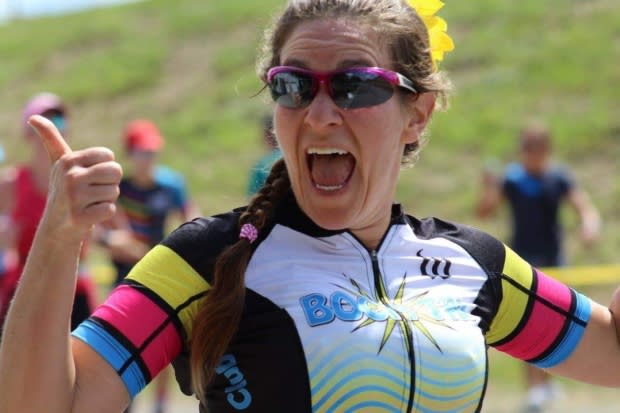Husband of triathlete killed in Mont-Tremblant slams race organizers for 'vague, cryptic' account of her death
When Ken Morris got a call at 1 p.m. last Sunday to come down to the medical tent at the site of the Ironman 70.3 event in Mont-Tremblant, in Quebec's Laurentians, he wasn't worried.
He'd been tracking the progress of his wife, Jill Levy Morris, 46, on his cellphone, and he knew she'd passed the final turnaround of the race's 90-kilometre bike portion some time before.
At that point, the Florida triathlete was three hours and 45 minutes into her ride — a half an hour ahead of where she'd expected to be, with just nine kilometres to go before she should be starting her run.
He assumed she'd had a minor mishap.
"I thought she probably had some scratches or bruises or something," he said. "When I got there, I was met by two women — and not Jill. That's when I knew something was going on."
The women told him he couldn't see his wife yet and made him sit down until two men arrived, about half an hour later, to break it to him that his wife was dead.
"Naturally, I went nuts," he said.
A 'medical event'
"They said it was a medical event," Morris recalled, in an interview with CBC News. "That's something that upsets you because it is very vague and cryptic."
He said the race officials made it sound like Jill had perhaps suffered a heart attack or some other coronary-related incident out on the course. They told him she'd veered into the path of a race support vehicle. It was only days later he learned she died after being crushed under the truck's wheels.
"They told me they believed that's what it was," he said of race officials' version that the death was a medical event. "I don't know to this day if they were treating her for that, or treating her for trauma — or what."
Indeed, "a medical event" is how Ironman 70.3 organizers described Jill's death in a brief post to their Facebook group at 6 p.m. Sunday, a couple of hours after the end of the race.
"In respect of the family's privacy, we will have no further comment," read the post.
Event officials have stuck to that position: Ironman's public relations arm at World Triathlon Corporation headquarters in Tampa Bay, Fla., referred all questions to "local authorities."
In a brief phone conversation with CBC News Friday, Mont-Tremblant's race director Dominique Piché said he could not say anything more while the triathlete's death is under investigation.

Struck by race vehicle
Talking to officials right after his wife's death, Ken was left to understand that Jill had been suffering from some kind of ailment as she climbed Duplessis Road, near the 87.5-kilometre mark on the bike course, where she'd encountered two race support vehicles parked on the shoulder.
Somehow she had swerved into the path of one of those vehicles as it had pulled out onto the roadway, and the vehicle had been unable to avoid running her over.
According to what witnesses told Mont-Tremblant police, the triathlete had been pale and sick-looking.
"An investigation is ongoing into exactly what happened," said police spokesperson Alexandre Boucher.
"The woman veered from her lane and hit a race vehicle that was coming in the opposite direction."
Boucher says the driver of the vehicle will not face repercussions.
Coroner rules out heart issues
It was not until Wednesday, three days after the fatal incident, that her husband got a call from the Quebec coroner and learned what had killed his wife.
"The official cause of death was thoracic compression, with several of her internal organs crushed during the impact," he told friends and family on social media. "There was absolutely zero evidence of pulmonary or heart-related issues that caused Jill's death."
Ken does not buy one theory circulating on social media that his wife might have been dehydrated or suffering from some other ailment caused by overexertion.
Race day had been sunny but not excessively hot — about 26 C.
"She's been doing Ironmans and half-Ironmans for a long time," he said — and other races, too, including an 80-kilometre endurance run last January. "She knows exactly how to hydrate her body accordingly.

Before he left Mont-Tremblant, Ken visited the precise spot where his wife had been killed.
"I saw that hill," said Morris. "I wouldn't say it's steep. It's probably an average hill, compared to the rest of the course."
"Is it possible she was doing some type of serpentine movements to try to get up the hill? I suppose so," he ventured. "But the thing that kills me is, if that's what this driver saw … he had plenty of time to see her."
"Why that vehicle was moving with my wife approaching him is just beyond comprehension."
You cannot have service vehicles operating on roads when bikers are coming through in either direction. You just can't. - Ken Morris, husband of triathlete Jill Levy Morris
Duplessis Road was closed to all traffic, with the exception of race support vehicles, at the time of Jill's death.
Ken's tone is measured, but he is incensed at race officials for allowing clean-up crews on the course while there were still scores of cyclists on the road.
"You cannot have service vehicles operating on roads when bikers are coming through in either direction. You just can't," he said.
"This is a closed area where [race organizers] are in charge of the situation, and bikers and swimmers and runners have to be 100 per cent safe. They shouldn't have to worry about where they're going, when they're going, how they're going because they have other things to focus on instead of, 'Well, maybe I just might lose my life if I make the wrong move.'"
'Incredible, goal-oriented person'
A physical therapist-turned-clinical informatics specialist, Jill Levy Morris was the mother of two boys — Benjamin, 13, and Zachary, who turned 17 two days after his mother died.

The social media pages of her friends and fellow runners and triathletes are replete with photographs of a beaming, vital woman and anecdotes of how she inspired, helped and encouraged her friends.
"The outpouring of love has been overwhelming," said her friend and fellow athlete, Kimberly Cooper. "She was part of so many communities in South Florida alone."

"As a physical therapist, I worked with too many people who couldn't and was always thankful for the ability to put one foot in front of the other," Jill wrote in 2017, in a letter to a women's running community she belonged to called Fellow Flowers.
"I try to find joy and laughter everyday and especially in mundane tasks."
A rack in Ken and Jill Morris's bedroom is hung with the hundreds of finisher's medals she collected since she began running in 1999, from 10K races to Ironman events to five-day endurance challenges.
"She was the most dedicated, honest, hard-working person I've ever met," said her husband. "She could put 10,000 things into 24 hours, and if she need to put 20,000 things into that time, she could do it."
"She was an incredible, goal-oriented person."
Her funeral is today — one week to the day of her death — in Boynton Beach, Fla.
Her husband has been reluctant to talk to reporters, but he is hoping by speaking publicly, an independent witness — someone other than the vehicle driver or the driver of the second race support vehicle that had been parked at the spot — will come forward to report what they saw.
"It doesn't bring her back, and it doesn't change the fact that those vehicles were there and they shouldn't have been, and the driver was moving and shouldn't have been," Ken said.
"I really would just like to see if there's a way to piece together exactly her last seconds and figure out how this happened."


